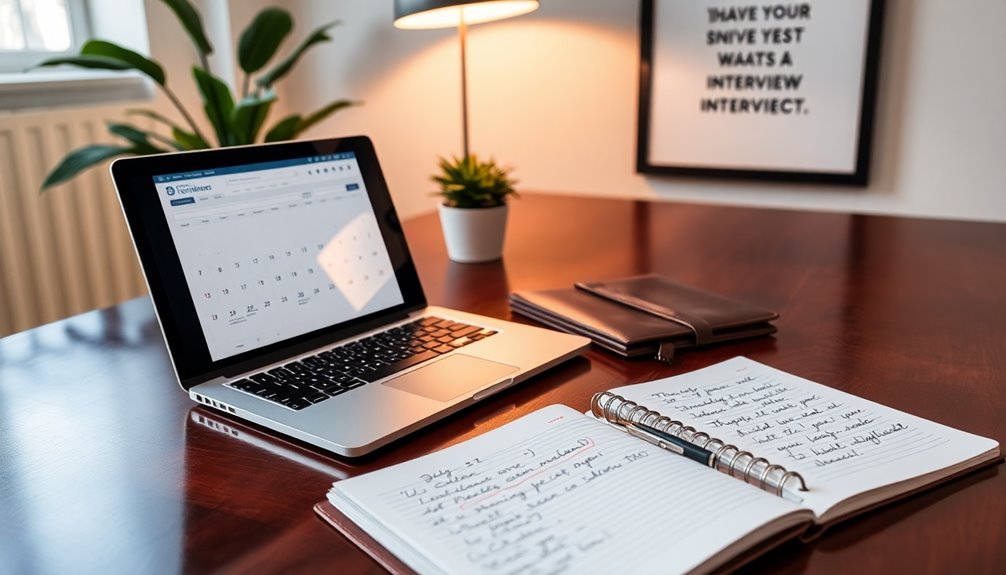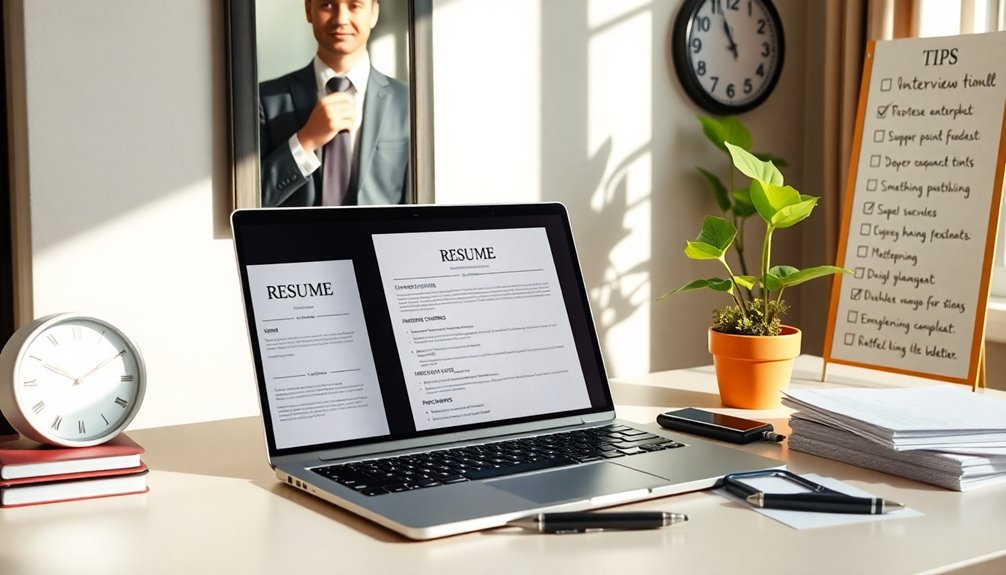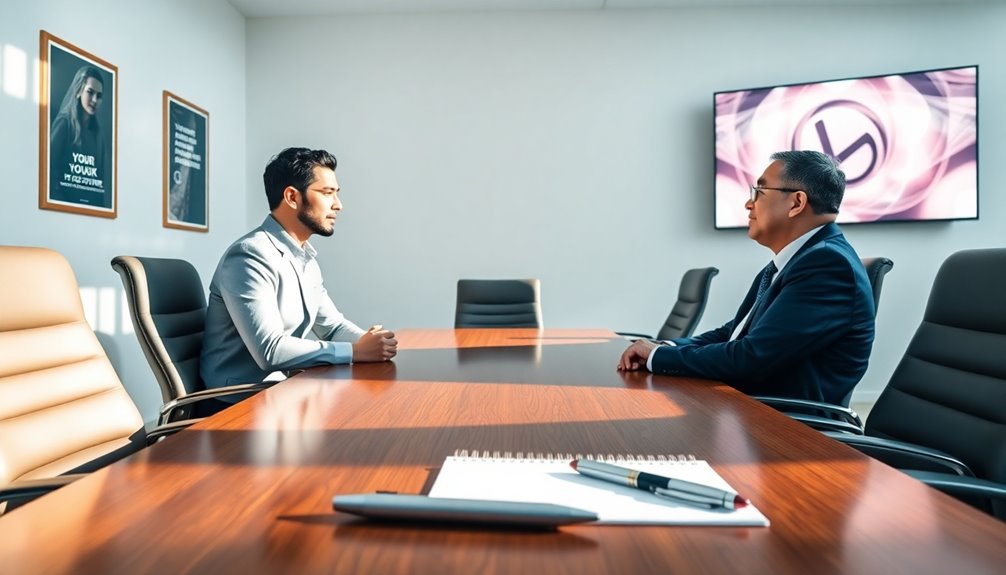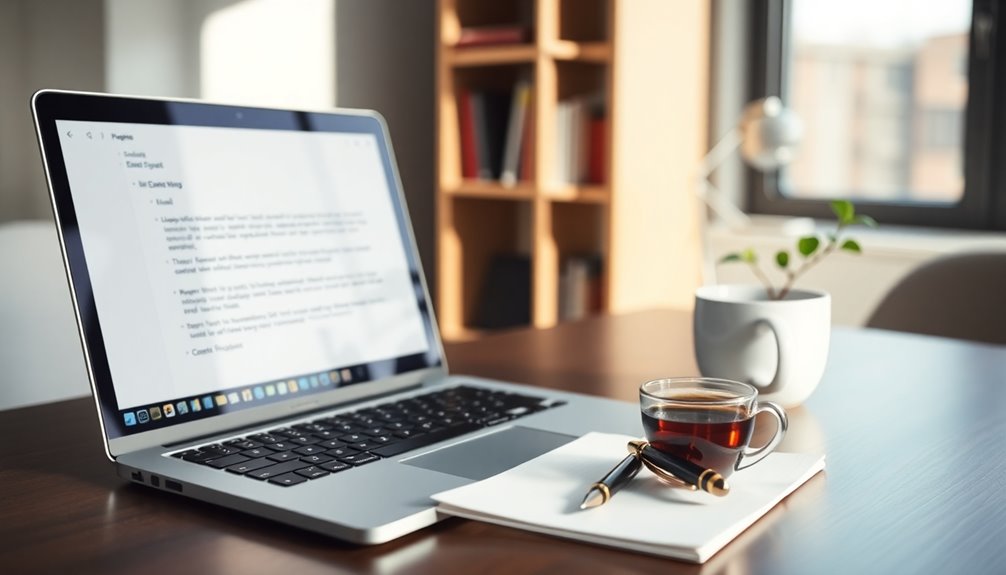To master your next interview, start with thorough research about the company's history, mission, and recent achievements. Analyze the job description to connect your skills with what they need. Prepare specific, tailored answers for common questions using the STAR method. Remember, body language matters—maintain eye contact, offer a firm handshake, and dress appropriately. Don't forget to follow up with a thank-you email to express your gratitude and enthusiasm for the role. As you implement these techniques, you'll enhance your chances of success and may discover further strategies that can elevate your performance.
Key Takeaways
- Research the company's history, values, and recent achievements to tailor your responses effectively.
- Analyze the job description to highlight relevant skills and past experiences that align with the role.
- Prepare for common interview questions using the STAR method to structure your answers.
- Maintain positive body language, including eye contact and an open posture, to convey confidence.
- Follow up with a personalized thank-you email to reinforce your interest and professionalism.
Research and Preparation
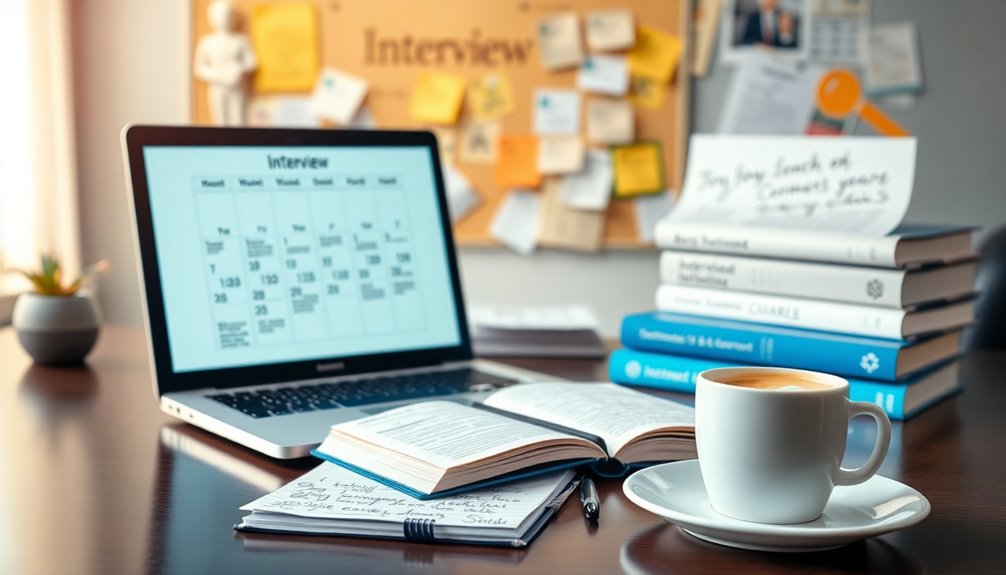
Thorough research and preparation are essential steps in acing your next interview. Start by gathering information on the company's history, mission, and values. Familiarize yourself with recent news and achievements to provide context during your discussions.
Utilize the company's website and social media platforms for deeper insights. Employee reviews on sites like Indeed can offer valuable perspectives as well. Knowing the interviewer's background can help you establish a connection.
Understanding the company's core values will guide your responses, aligning your answers with their expectations. Additionally, researching industry trends equips you with relevant talking points, demonstrating your knowledge and enthusiasm. Furthermore, applying the principles of the Law of Attraction can enhance your confidence and mindset leading up to the interview.
Job Description Analysis

Analyzing the job description is essential for tailoring your interview preparation effectively. It helps you understand what the employer truly wants, allowing you to align your experiences and skills with their needs.
Here are some key points to focus on:
- Identify required skills and qualifications that match your background.
- Highlight specific responsibilities that you've successfully handled in the past.
- Connect your career goals with the job's opportunities for growth.
- Note any unique aspects of the position that resonate with you.
- Prepare to discuss how you can contribute to the company's success.
Answering Interview Questions

Once you've identified the key elements from the job description, it's time to focus on how to effectively answer interview questions. Start by compiling a list of common questions and developing tailored responses that highlight your qualifications.
Use the STAR method to structure answers for behavioral questions, ensuring you cover the Situation, Task, Action, and Result succinctly. When discussing your experiences, keep your narrative engaging and concise.
Be prepared to address "Why should we hire you?" and "Why do you want to work here?" with clear, compelling reasons. Always frame any negative experiences positively, emphasizing lessons learned.
This approach not only showcases your skills but also demonstrates your readiness to contribute meaningfully to the organization.
Body Language Matters

Your body language plays a crucial role in creating a positive impression during interviews. It can convey confidence, enthusiasm, and professionalism, helping you stand out. Focus on these key aspects:
- Firm handshake: It shows confidence and sets a positive tone.
- Eye contact: Maintaining it fosters connection and demonstrates engagement.
- Open posture: This indicates you're attentive and interested in the conversation.
- Appropriate attire: Dressing according to the company culture reflects your understanding and respect.
- Grooming: Good personal hygiene creates a favorable first impression.
Being mindful of your body language can greatly impact how interviewers perceive you. So practice these elements to enhance your overall presence during interviews.
Engaging With Interviewers

Engagement during an interview fosters a meaningful connection between you and the interviewer, setting the stage for a productive dialogue.
To make a lasting impression, prepare insightful questions about the company culture and goals. Show genuine interest by asking about professional development opportunities.
Using the interviewer's name during the conversation not only personalizes the interaction but also builds rapport.
Project energy and enthusiasm, especially in virtual settings, as it can elevate the overall tone of the discussion.
Adapt your body language for online formats; maintain eye contact and an open posture to convey attentiveness.
These strategies not only demonstrate your interest but also create a collaborative atmosphere, making you a memorable candidate in the interviewer's mind.
Follow-Up Communication
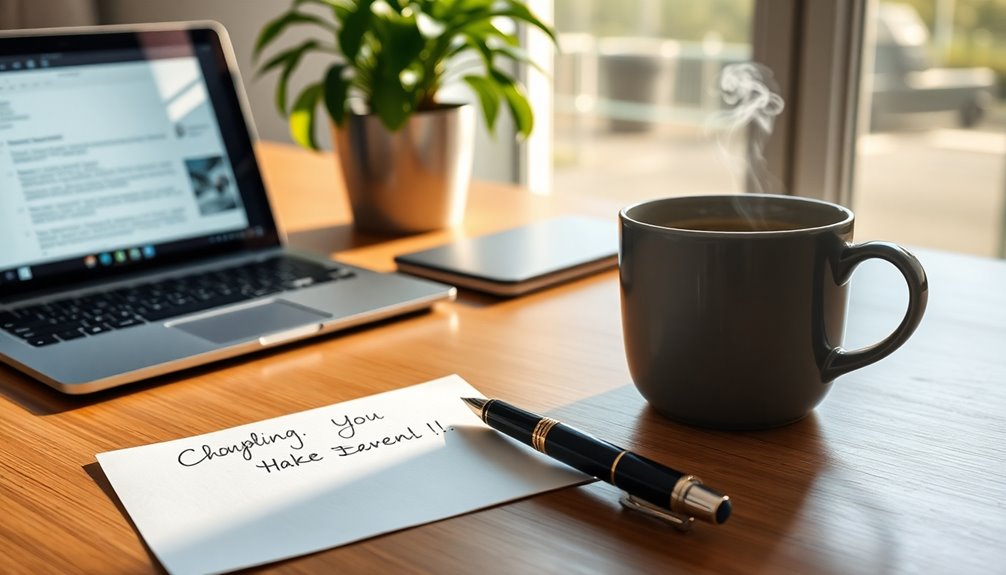
Following up after an interview is an essential step in the job application process. A thoughtful follow-up can reinforce your interest and leave a lasting impression. Here are some key tips to take into account:
- Send a thank-you email within 24 hours to express gratitude.
- Reiterate your enthusiasm for the position and the company.
- Personalize your message by referencing specific topics discussed.
- If you haven't heard back in a week, think about a polite follow-up.
- Keep communications professional and concise, emphasizing your fit for the role.
These steps not only show your professionalism but also help keep you top-of-mind for the hiring team.
Make sure your follow-up reflects your genuine interest and commitment to the opportunity.
Effective Interview Strategies

An effective interview strategy can make all the difference in securing a job offer. Start by conducting mock interviews to build your confidence and familiarize yourself with common questions.
Understand the structure of the interview stages; initial rounds often focus on screening candidates. Use feedback from these screenings to refine your pitch for subsequent interviews.
Pay attention to body language—maintain eye contact and an open posture to convey engagement. Prepare insightful questions about the company's culture and growth opportunities, which can showcase your genuine interest.
Finally, let the employer lead salary discussions, as this illustrates your understanding of their budget. By implementing these strategies, you'll position yourself as a strong candidate. Effective interview preparation can also enhance your overall performance by improving time management skills, which are crucial in demonstrating your organizational abilities during the interview process.
Frequently Asked Questions
What Should I Bring to the Interview?
When you head to an interview, bring several essential items.
Start with multiple copies of your resume, as interviewers might need them. Don't forget a notepad and pen for taking notes or jotting down questions.
If applicable, include a portfolio showcasing your work.
Finally, make certain you have a list of questions for the interviewer; this shows your interest and preparation.
These items will help you make a strong impression.
How Early Should I Arrive at the Interview?
Showing up like a knight before battle, you should aim to arrive 10 to 15 minutes early for your interview. This window allows you to settle in and gather your thoughts without feeling rushed.
Being punctual demonstrates respect for the interviewer's time and showcases your professionalism. If you arrive too early, though, it might inconvenience the interviewer, so find that sweet spot to make a great first impression.
What if I'm Running Late for the Interview?
If you find yourself running late for an interview, don't panic.
Quickly call or message the interviewer to inform them of your situation and estimated arrival time. Apologize for the inconvenience and express your enthusiasm for the meeting.
Once you arrive, stay composed and focused. Acknowledging your tardiness gracefully can demonstrate professionalism, showing that you respect their time even when circumstances are out of your control.
Can I Use My Phone During the Interview?
Using your phone during an interview is like trying to dance in a minefield—one wrong move can lead to disaster.
It's best to keep it tucked away, silent and unseen. If you need to refer to notes, ask permission first.
You want to show respect and focus on the conversation, not get distracted by notifications.
What Is the Dress Code for Interviews?
When considering the dress code for interviews, it's crucial to research the company culture first.
If the workplace leans formal, opt for a suit or professional attire. For more casual environments, smart business casual may suffice.
Always prioritize neatness and grooming, as first impressions matter. When in doubt, it's better to be slightly overdressed than underdressed.
Your attire should reflect your respect for the opportunity and the organization.
Conclusion
By blending bold preparation and compelling communication, you can conquer your next interview. Remember, your research roots you in the company's culture, while your body language beckons connection. Don't forget to dazzle with dynamic questions that demonstrate your genuine interest. With these strategies in your toolkit, you're not just ready—you're resilient and remarkable. So step in with confidence, and let your unique qualifications shine. Success is just a conversation away!
